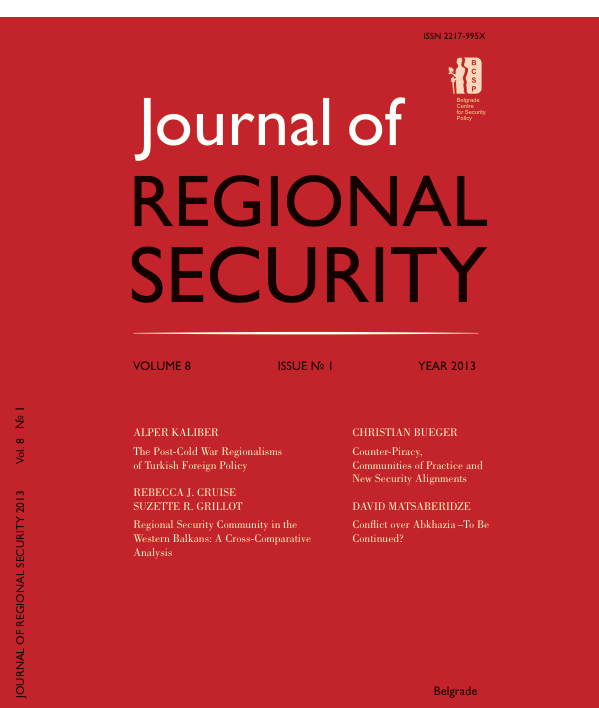Conflict over Abkhazia – To Be Continued?
Abstract
This paper analyzes the potential for maintaining the post-August War 2008 status quo in Abkhazia and explores possible transformation scenarios of the existing situation. The present study will attempt to investigate the remaining seeds of prospective conflict, as the current reality might contain some potential for the eruption of violence; namely: the construction of the Sochi Olympic complex which irritates Georgians and Circassians as well as portion of Abkhazians; the North Caucasian new policy line, initiated and followed by the central Georgian authorities: and Georgia’s recognition of the Russian Genocide of Circassians in the 19th century, which should become leverage against the Russian Federation in the wider Caucasus region. All of these aspects make up the present security dilemma in the region. It is interesting to see whether changes in the Abkhazian-Georgian and Abkhazian-Russian relations could be expected in the foreseeable future.
References
Abulashvili, Ia. 2010. United Caucasus – A Good Idea or the Precondition for Reality? October 16.. Accessed on May, 2012. http://www.resonancedaily.com/index. php?id_rub=2&id_artc=4015
Action Plan for Engagement, Office of the State Minister for Reintegration, endorsed on 06.07.2010. Accessed on May 2011. http://www.smr.gov.ge/uploads/action_plan_ en.pdf
Asmus, D. Ronald. 2010. A Little War that Shook the World – Georgia, Russia and the Future of the West. New York: Palgrave Macmillan.
Khaindrava, Ivlian. 2011. Georgia’s Recognition of the Circassian Genocide in the Context of the Georgian-Abkhaz-Russian Relations. Accessed on May, 2012. http:// www.international-alert.org/our-work/caucasus-dialogues-perspectives-region/ circassian-genocide-georgian-abkhaz-russian-relations
Illarionov, Andrei. 2009. The Russian Leadership’s Preparation for War, 1999−2008, in Svante E. Cornell and Frederick Starr, eds. The Guns of August 2008 – Russia’s War in Georgia. M. E. Sharpe, Central Asia−Caucasus Institute & Silk Road Studies Program Joint Center, 49−84.
International Society Talks on the Creation of the Unites States of the Caucasus. Posted on 13.04.2011. Accessed May, 2012. http://www.regnum.ru/news/1394475. html
Khashig, Inal. 2011. The Politics behind Georgian Parliaments Recognition of
the Circassian Genocide. Accessed on May, 2012. http://www.international-alert. org/our-work/caucasus-dialogues-perspectives-region/politics-behind-georgian- parliament%E2%80%99s-recognition-circassian-genocide
Khelashvili, George. 2011. Georgian Perceptions of the North Caucasus and of U.S. −Russian Relations, in PONARS Eurasia Policy Memo No. 148, May. Accessed May, 2012. http://www.gwu.edu/~ieresgwu/assets/docs/ponars/New_Balances.pdf
Newspaper SakhartvelosRespublika, 20 February 2010. Newspaper Rezonansi, 20 February 2010.
O’Loughlin, John.,Kolossov, Vladimir and Toal, Gerard. 2011. “Inside Abkhazia: Survey of Attitudes in a De Facto State,” Post-Soviet Affairs, 27: 1−46.
Opinion: The Influence of Georgia on the North Caucasus is Rising, 12.10.2010. Accessed on May, 2012. http://www.regnum.ru/news/1335057.html
Phillips, L. David. 2008. Restoring Georgia’s Sovereignty in Abkhazia, (Policy Paper), The Atlantic Council of the United States.
Phillips, L. David. 2010. Peace Building and Business: Fostering Commercial Contact between Georgians and Abkhaz. June. Accessed on May, 2012.
http://www.ncafp.org/articles/10%20Georgia%20Peacebuilding%20and%20Business. pdf
Popjanevski, Johanna. 2009. “From Sokhumi to Tskhinvali: The Path to War in Georgia.” In Svante E. Cornell and Frederick S. Starr. eds. The Guns of August 2008 – Russia’s War in Georgia. M. E. Sharpe, Central Asia−Caucasus Institute & Silk Road Studies Program Joint Center, pp. 143−161.
State Strategy on Occupied Territories: Engagement through Cooperation,Office of the State Minister for Reintegration, 27.01.2010. Accessed May, 2012. http://www. smr.gov.ge/docs/doc204.pdf
Turkey Plans to Create Union with Georgian and Azerbaijan. 03.08.2010. Accessed on May, 2012. http://www.regnum.ru/news/1311467.html
Venediktova, Nadezhda. 2010. Policy of isolation/nonrecognition and security of Abkhazia, in EU-Caucasus Dialogues on Georgian-Abkhaz Relations, roundtable, International Alert, 29th November. Accessed on May, 2012. http://www.international-alert.org/sites/default/files/publications/201011EUCaucas usDialogue.pdf
Authors retain copyright of the published papers and grant to the publisher the non-exclusive right to publish the article, to be cited as its original publisher in case of reuse, and to distribute it in all forms and media.
The published articles will be distributed under the Creative Commons Attribution 4.0 International License (CC BY). It is allowed to copy and redistribute the material in any medium or format, and remix, transform, and build upon it for any purpose, even commercially, as long as appropriate credit is given to the original author(s), a link to the license is provided and it is indicated if changes were made. / The published articles will be distributed under the Creative Commons Attribution ShareAlike 4.0 International license (CC BY-SA). It is allowed to copy and redistribute the material in any medium or format, and remix, transform, and build upon it for any purpose, even commercially, as long as appropriate credit is given to the original author(s), a link to the license is provided, it is indicated if changes were made and the new work is distributed under the same license as the original.
Users are required to provide full bibliographic description of the original publication (authors, article title, journal title, volume, issue, pages), as well as its DOI code. In electronic publishing, users are also required to link the content with both the original article published in Journal of Regional Security and the licence used.
Authors are able to enter into separate, additional contractual arrangements for the non-exclusive distribution of the journal's published version of the work (e.g., post it to an institutional repository or publish it in a book), with an acknowledgement of its initial publication in this journal.
Authors are permitted to deposit author’s pre-print / author’s post-print (accepted version) / publisher's version (PDF) of their work in an institutional repository, subject-based repository, author's personal website (including social networking sites, such as ResearchGate, Academia.edu, etc.), and/or departmental website prior or during the submission process / at any time after the acceptance of the manuscript / at any time after publication.
Full bibliographic information (authors, article title, journal title, volume, issue, pages) about the original publication must be provided and links must be made to the article's DOI and the license.

